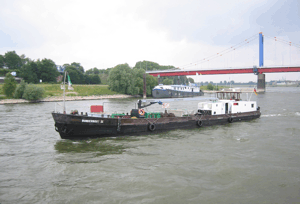The purpose
of the Round Table was to determine the conditions for introducing
low-sulphur fuel that are compatible with the development of inland
waterway transport in Europe. The positions of the stakeholders were
clarified and the proposal of the European Commission for the amendments
for the respective fuel directives was discussed, unresolved issues
were identified and addressed, the need for further analysis and studies
was defined, and the diverging points of view of the parties involved
were reconciled.
The Round Table
covered technical aspects, such as the compatibility
of engines, both new and currently in use, with low-sulphur fuel (safe
operation), the operational and logistics aspects of
shifting from one type of fuel to another, including making low-sulphur
fuel available throughout Europe, and economic aspects,
such as costs incurred by the inland waterways transport profession.
The participants
of the Round Table were representatives of the European Commission,
professionals in inland waterway transport, from the engine manufacturers,
the oil industry, the ship-building industry, bunker services, classification
societies, and the competent national authorities in the CCNR’s Member
States and Observer States.
The program
of the Round Table and presentations of participants
can be found below.

